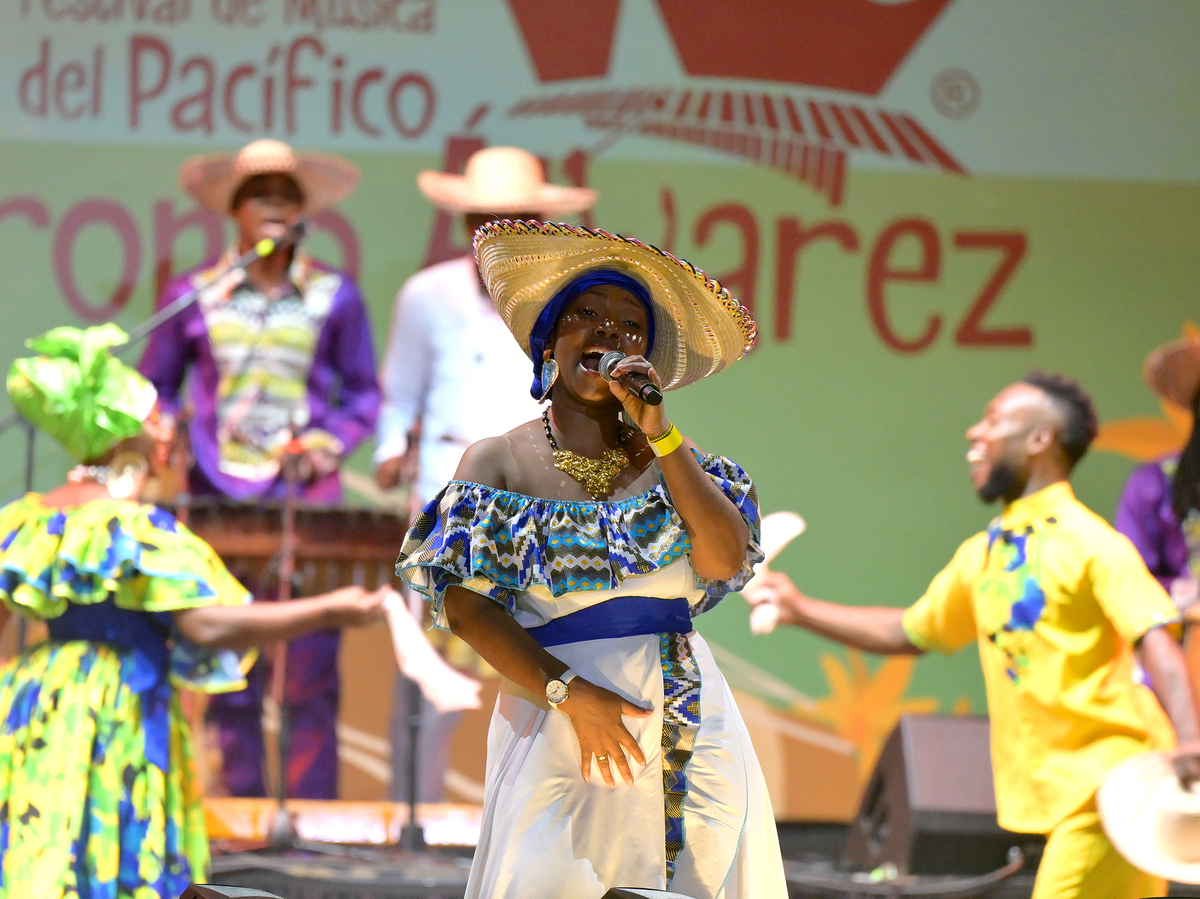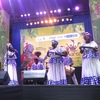
Almost 500,000 folks gathered in Cali, Colombia for the twenty seventh annual Petronio Alvarez Pageant. Nidia Góngora and her group Canalón de Timbiquí carried out on the principle stage.
Edward Lora
disguise caption
toggle caption
Edward Lora

Almost 500,000 folks gathered in Cali, Colombia for the twenty seventh annual Petronio Alvarez Pageant. Nidia Góngora and her group Canalón de Timbiquí carried out on the principle stage.
Edward Lora
Unidad Deportiva Alberto Galindo, a sports activities advanced in Cali, Colombia, is dwelling to what’s affectionately referred to as “El Petronio.” For the final 27 years, tons of of 1000’s of individuals have traveled to the town to rejoice Afro-Colombian meals, vogue, arts and crafts, an area moonshine, and most significantly, music.
The live performance house seems like an enormous avenue social gathering, the place folks wave white handkerchiefs and drink Viche and plenty of water. Everybody dances in small or massive teams to the joyful, rhythmic and fascinating music performed on marimbas, drums, percussion devices and voices of Afro-Colombian ladies and men from the Pacific coast.

Folks dance throughout this 12 months’s Petronio Alvarez Pacific Music Pageant in Cali, Colombia.
Joaquin Sarmiento /AFP by way of Getty Photographs
disguise caption
toggle caption
Joaquin Sarmiento /AFP by way of Getty Photographs

Folks dance throughout this 12 months’s Petronio Alvarez Pacific Music Pageant in Cali, Colombia.
Joaquin Sarmiento /AFP by way of Getty Photographs
“What this competition has achieved prior to now 27 years is to inform Colombia and the world that we’re a multi-ethnic and multicultural nation,” says Ana Copete. She has directed the competition since 2020. “We, as Afro-Colombians, have cast the identification of this nation; we have now constructed this nation, hand in hand with others. And we deserve the dignity of our tradition, not solely as folklore however as a lifestyle.”
The competition has grow to be the most important supply of revenue for musicians, cooks, artisans and distributors. Nidia Góngora, a world-renowned singer-songwriter from the small city of Timbiquí, Colombia, says dozens of small companies, accommodations and eating places throughout the town profit from the Petronio. This 12 months, the competition generated almost $1 million. “The constructive impression generated by cultural actions, resembling this competition, must be thought of elementary within the building of peace and progress of each society,” Góngora says.
However the competition additionally has critics. Addo Obed Possú is a 67-year-old luthier making marimbas, drums and different conventional devices of the area. Possú claims the competition is turning into political, and the organizers now embrace massive acts which have little to do with the musical tradition, resembling the favored salsa band Grupo Area of interest.
“It takes away funds from a Black musician, who comes from the deep territories of the Pacific Coast, to carry out conventional music and be on the highlight throughout the competition,” he says. “For instance, with the sum of money they pay Grupo Area of interest, they may double the pay of every of the teams that come from the 4 taking part areas.”
Remolinos de Ovejas is likely one of the 44 taking part teams who got here to Petronio from the distant city of La Toma, deep within the Cauca State. It is a area racked by violence attributable to guerrillas and paramilitary teams. (The group gained second place within the ‘Violins from the Cauca’ music class.) One of many songs the group carried out on the competition known as Historia de un campesino, a narrative of a peasant.
“The lyrics inform the story of a person who was displaced by the guerrillas,” says singer Carmen Lucumí. “He was a peasant; he had a household and needed to transfer elsewhere as a result of the armed teams killed his spouse and youngsters and burned down his home. He wrote a tune primarily based on what occurred to him and gave it to us. We put music to it so that everybody may hear his story.”

Cultural Professor Manuel Sevilla says the competition symbolizes endurance and resistance, regardless of the area’s historical past.
Joaquin Sarmiento /AFP by way of Getty Photographs
disguise caption
toggle caption
Joaquin Sarmiento /AFP by way of Getty Photographs

Cultural Professor Manuel Sevilla says the competition symbolizes endurance and resistance, regardless of the area’s historical past.
Joaquin Sarmiento /AFP by way of Getty Photographs
Regardless of dealing with racism, inequality and violence, the Afro-Colombian folks of the Pacific Coast have stayed resilient and inventive, conserving their tradition robust and vibrant.
“A part of the historical past of this area has been a violent one, a harsh one,” says Manuel Sevilla, a professor of cultural heritage at Universidad Javeriana in Cali. “And initially, if we return to the slave commerce days, after all, these are individuals who got here right here in opposition to their will and who needed to endure many difficulties. I feel you would have a look at Petronio Alvarez from either side: one, it is a image of endurance; it is a image of resistance: ‘Regardless that they tried to deprive us of all the pieces, right here we’re and that is what we have now.'”
Sevilla says the competition is proof that Afro-Colombians’ music and tradition have been thriving for hundreds of years, and the Petronio Pageant exhibits how creativity and hope proceed to flourish right here.


